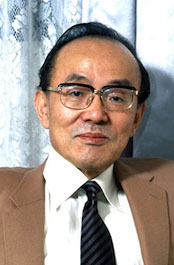Shūsaku Endō
- HEATHER KING
Shūsaku Endō (1923–1996), Japanese Roman Catholic novelist, authored Silence, adapted into a film in 2016.
 The Christian Faith is a consistent theme throughout his writings.
The Christian Faith is a consistent theme throughout his writings.
Born in Tokyo in 1923, Endō was raised by his mother and an aunt following the early death of his father. He converted as a pre-adolescent to Catholicism and suffered from a variety of illnesses and a sense of exile for much of his life.
He began studies at Keio University in Tokyo in 1943 and, for the next two decades, attended and taught at a variety of universities in Japan and France. He won a prize for his first novel in 1954, married the following year, and came to be considered part of the "Third Generation" of Japanese writers to emerge after World War II.
Silence (1966), widely considered to be his masterpiece, is set in early 17th-century Japan, a time of virulent anti-Catholicism. Believers were savagely tortured by, among other ways, being hung upside down over a sewage pit and slowly bled to death. To escape this torment, they were urged to apostasize by trampling upon an image of the face of Christ known as a fumi-e.
In Endō's stage version of the story, The Golden Country, an anti-Christian official observes: "The teachings of Christ are like a flame. Like a flame they set a man on fire. But the tepid warmth of Japan will eventually nurture sleep." How aptly those words could apply to our contemporary "tepid warmth" of consumerism, materialism, and mass media.
In 1990, William Johnston, s.j., translator of Silence, conducted an interview with Endō. In it, Johnston mentioned a contemplative nun who had written him and observed that Silence was at bottom a novel about prayer. Prayer for her, she said, was a struggle — as it had been for Mary Magdalene, Peter, and so many others who had wrestled with or denied Christ, then surrendered.
At Mass one recent Sunday morning, I was so exhausted from the weekly round of work, prayer, and attempted service that I could barely stay awake. Part of me felt guilty. The other part felt grateful that, while sitting during the Liturgy of the Word and kneeling for the Eucharistic prayer, I could simply close my eyes, while trying to listen, and rest.
Just as I wearily stood for the Lord's Prayer, my gaze happened to rest upon the stained-glass window behind the altar. There was Christ, his hand lifted in benediction, beneath it the words "Come to me, all you who labor." He might as well have whispered the words in my ear, so deeply did I feel his consolation and presence.
For Endō, a Catholic in a country with very few Catholics, an intellectual torn between cultures, a man with the sensitivity of a poet who was physically ill for much of his life, his own faith must have been a struggle. One hopes that for him as well the silence was finally broken.
Perhaps what he heard at the last was Matthew 10:28: Silence And do not be afraid of those who kill the body but cannot kill the soul; rather, be afraid of the one who can destroy both soul and body in Gehenna .
 This is Meaghen Gonzalez, Editor of CERC. I hope you appreciated this piece. We curate these articles especially for believers like you.
This is Meaghen Gonzalez, Editor of CERC. I hope you appreciated this piece. We curate these articles especially for believers like you.
Please show your appreciation by making a $3 donation. CERC is entirely reader supported.

Acknowledgement
 Heather King. "Shūsaku Endō." Magnificat (September, 2019).
Heather King. "Shūsaku Endō." Magnificat (September, 2019).
Reprinted with permission from Magnificat.
Join the worldwide Magnificat family by subscribing now: Your prayer life will never be the same!
The Author

 Heather King is a sober alcoholic, an ex-lawyer, a Catholic convert, and a full-time writer. She is the author of: Parched, Redeemed: Stumbling Toward God, Marginal Sanity, and the Peace That Passes All Understanding, Shirt of Flame: A Year with St. Thérèse of Lisieux, Poor Baby, Stripped, Holy Days and Gospel Reflections, and Stumble: Virtue, Vice, and the Space Between. She lives in Los Angeles. Visit her website here.
Heather King is a sober alcoholic, an ex-lawyer, a Catholic convert, and a full-time writer. She is the author of: Parched, Redeemed: Stumbling Toward God, Marginal Sanity, and the Peace That Passes All Understanding, Shirt of Flame: A Year with St. Thérèse of Lisieux, Poor Baby, Stripped, Holy Days and Gospel Reflections, and Stumble: Virtue, Vice, and the Space Between. She lives in Los Angeles. Visit her website here.




